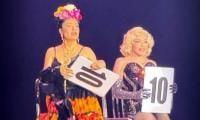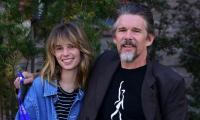Islamabad:Achievements of women were celebrated and issues they face were stressed in variety of events organised to commemorate the International Women’s Day on Friday. The atrocities faced by women in Palestine were special focus of all the events where the participants demanded the world community to intervene and stop Israel from committing blatant human rights violations.
The highlight of the day was the ‘Aurat March’ held in front of the National Press Club (NPC). The annual gathering of women rights activists was once again marred by tension between the organisers and the city administration as march participants were denied access to D-Chowk, the final destination of the ‘Aurat March’ every year. As a result, the march remained restricted within the area in front of the NPC.
The march organisers shared with ‘The News’ that the administration has not issued NOC to the ‘Aurat March’ and has informed them that the representatives of religious groups has already gathered at the D-Chowk . Roads leading to D-Chowk from National Press Club were blocked by administration through barbed wires which resulted in traffic blocks in adjoining areas.
The march participants tried breaking the blockade of police force but faced resistance. After some tense hours, the march organisers decided to stay at the NPC and held all performances and speeches at the same place. “The participants included senior citizens and children. They were all ready to break the blockade and march towards D-Chowk as they believed that it is their right. But looking at the situation, we decided to remain at NPC. We didn’t want anyone to get hurt,” said human rights activist Farzana Bari.
Bari said that they have decided to hold a press conference on what happened on March 8. “Unfortunately, this has become an annual practice that the ‘Aurat March’ is restricted by the administration. We took the decision to remain at NPC for the security of participants as we didn’t want any mishap but we will raise our voice against this practice,” she said.
The participants of the ‘Aurat March’ were holding placards inscribed with slogans. They chanted slogans for women empowerment and freedom while side by side demanded freedom and justice for Palestinian women. They were wearing Keffiyeh (Palestinian scarf) and played resistance Palestinian songs.
“The theme of this year’s March revolves around resistance and hope. We can see state has failed in giving constitutional rights to people and those who raise voice against that, they are targeted. And the resistance movements are mostly led by young women,” said Farzana Bari while talking to ‘The News’. She said that “we also have hope from these movements. We believe that if these movements unite, they have the potential to create the world free of discrimination and injustice.”
Eminent Human Rights activist Tahira Abdullah said that Pakistani women stand in solidarity with women of Palestine, Kashmir, Balochistan, families of enforced disappeared persons, political prisoners.
“Our demands have not changed over four decades as they have not yet been met. In fact, in some cases we have regressed. Recent example is that new Khyber Pakhtunkhwa Cabinet. It has only one women adviser and that too for women affairs. These is no other women Minister,” she said while also highlighting increase in feminization of poverty, gender-based violence and misogyny.
‘Aurat March’ organiser Uzma Yaqoob highlighted the trend of targeting of women for political point scoring. She demanded environment for real political participation of women where women can get elected on general seats, not the seats given by male political party leaders. Transgender leader Nayyab Ali also addressed the march participants and urged state for protection of transgender rights in the country.
The Charter of Demand presented on this occasion had 42 demands 9 areas including promotion of hope and world peace, end of gender-based patriarchal violence, action against cyber harassment, end of enforced disappearance, political rights for women, end-to-period poverty, improved access to universal education and healthcare and rights of religious minorities.
Representational image of a woman offering Fateha Khawani in a graveyard. — ANI FileRawalpindi: Rakh Dhamial...
The image released on June 8, 2023 shows the building of the Quaid-i-Azam University . —...
An Aedes Aegypti mosquito, which transmits the Zika, Chikungunya, Dengue and Yellow Fever viruses can be seen in this...
A prize distribution ceremony was organised to acknowledge & appreciate winners of poster competition on World Malaria...
A two-day regional cooperation workshop on combating Smuggling of Migrants and trafficking in person underway on...
Chairman Pakistan Red Crescent Society , Sardar Shahid Ahmed Laghari. — APP FileIslamabad : The Chairman Pakistan...







